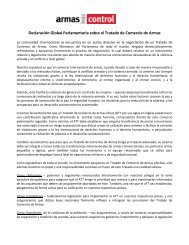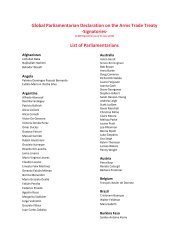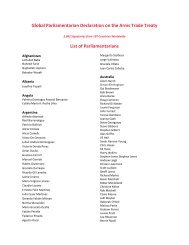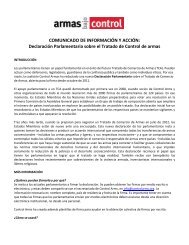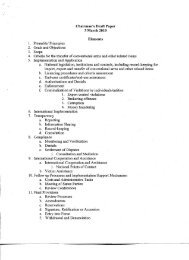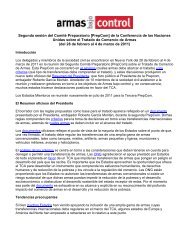SAFERWORLDvsuggests that an ATT could benef<strong>it</strong> from the establishment of a permanent or semipermanent‘executive-type’ inst<strong>it</strong>ution. Such an inst<strong>it</strong>ution would be tasked w<strong>it</strong>h overseeingthe day-to-day functioning of the regime, including the implementation of anymon<strong>it</strong>oring and verification provisions, as well as the work of an ATT Secretariat.Finally, where there is scope for civil society to make a pos<strong>it</strong>ive contribution to theeffective functioning of the regime, states should enable this.Consultation mechanisms: The paper notes that formal procedures governingconsultation among states parties on cases of suspected non-compliance have beenestablished under most international regimes. It suggests that, in drawing upon theseexperiences, an ATT should codify states parties’ rights to raise issues relating tocompliance e<strong>it</strong>her directly w<strong>it</strong>h other concerned states parties or through an officialbody. Consideration will also need to be given to any further provisions that might berequired where in<strong>it</strong>ial consultations fail to resolve a compliance issue. These couldinclude the right of the state party raising the concern to take the matter to an annualMeeting of States Parties or, in exceptional circumstances, to an extraordinary Meetingof States Parties. In establishing consultation mechanisms under an ATT, <strong>it</strong> will beimportant to guard against the raising of spurious or frivolous concerns over compliance.In this regard, a Treaty must establish clear evidentiary requirements based onreliable sources including, possibly, from open source information and civil society.Addressing compliance issues: A number of international agreements includearrangements for mon<strong>it</strong>oring and verification, some of which involve in-countryactiv<strong>it</strong>ies. These allow states parties to observe particular facil<strong>it</strong>ies or activ<strong>it</strong>ies on eachother’s terr<strong>it</strong>ory w<strong>it</strong>h a view to verifying compliance w<strong>it</strong>h treaty obligations. Whilerepresenting a substantial comm<strong>it</strong>ment by states parties, provisions for in-countrymon<strong>it</strong>oring and verification can help build confidence in the effective enforcement ofa treaty as well as promoting full compliance. The experience of the ChemicalWeapons Convention indicates that if such provisions are used early on w<strong>it</strong>hin the lifetimeof a treaty regime, and are targeted towards resolving low-level compliance issues,then such mechanisms are more likely to function effectively thereafter. Confidence isincreased particularly in those cases where an inspection regime includes a capac<strong>it</strong>ybuildingfunction that helps states parties meet their various obligations under thetreaty.Typically, mon<strong>it</strong>oring and verification mechanisms are not implemented to theoptimal extent. Nevertheless, experience suggests that such mechanisms are a valuabletool, especially as part of a package of compliance measures. The paper argues thatestablishment of regular mon<strong>it</strong>oring efforts under an ATT could contribute to thedevelopment of an effective regime, particularly if the verification provisions arebroadly applied, that is, not only w<strong>it</strong>hin arms exporting and importing states but alsoin trans<strong>it</strong> and transhipment states, as well as in those providing a base for theoperation of international arms brokers. Such activ<strong>it</strong>ies could include, for example,inspections of transfer licensing records and of procedures, and records kept, at ex<strong>it</strong>and entry points for arms shipments. Such measures would assist in highlighting caseswhereby, for example, data retrieval, management and storage or a lack of capac<strong>it</strong>y,resources or relevant expertise are preventing states from fulfilling their obligationsunder the Treaty. W<strong>it</strong>h such information to hand co-operative efforts could be undertakenand assistance provided so as to resolve such matters.Adjudication: The paper considers the different ways in which breaches of a Treatycould occur. The most serious type of breach would involve a state party licensing aninternational arms transfer in contravention of the terms of the Treaty. Proving thatsuch an international arms transfer had taken place would, of necess<strong>it</strong>y, involve twodistinct components. In the first instance a specified Treaty body (possibly an ATTSecretariat, an executive inst<strong>it</strong>ution, or a Group of Experts appointed by a designatedTreaty inst<strong>it</strong>ution) would need to establish beyond doubt that a particularinternational arms transfer of concern had, in fact, taken place. Once <strong>it</strong> had been
viMAKING IT WORK: MONITORING AND VERIFYING IMPLEMENTATION OF AN ARMS TRADE TREATYestablished that a ‘transfer of concern’ had taken place and the circumstancessurrounding the transfer had been clarified, <strong>it</strong> would need to be fully assessed by anappropriate Treaty inst<strong>it</strong>ution (for example a Meeting of States Parties) w<strong>it</strong>h a view toproviding a defin<strong>it</strong>ive judgement on the nature and scope of the Treaty breach and anyremedial steps to be taken. It is argued that establishing procedures of this type will beimportant in terms of boosting an ATT’s effectiveness and credibil<strong>it</strong>y.Dispute settlement: The paper further notes that more general disputes may ariseover Treaty implementation or the application of <strong>it</strong>s provisions. Every effort should bemade to resolve differences among states parties by means of the consultation mechanismsand other compliance provisions that are established under the Treaty. However,the possibil<strong>it</strong>y that intractable disputes will occur necess<strong>it</strong>ates the establishment ofclear dispute settlement procedures w<strong>it</strong>h the roles and responsibil<strong>it</strong>ies of differentinst<strong>it</strong>utions clearly specified. While the detailed investigation of any compliance issuemay well be undertaken in private, in order to maintain confidence in the regime theresolution of disputes should be made public.Sanctions: Desp<strong>it</strong>e containing provisions for verification and dispute settlement, fewarms control and non-proliferation regimes specify any sanctions in the event that atreaty breach is recognised. In such cases the major<strong>it</strong>y of regimes that specify anyfurther recourse simply refer the matter to the UN Secur<strong>it</strong>y Council and/or GeneralAssembly. The paper argues that where a state is established by a Meeting of StatesParties to be in persistent and flagrant violation of an ATT there should be recourse tothe possible impos<strong>it</strong>ion of sanctions against the offending state party – including thepotential impos<strong>it</strong>ion of an arms embargo.An effective <strong>Arms</strong> Trade Treaty: Ideally, the establishment of effective reporting,information exchange, transparency, inst<strong>it</strong>utional, verification and complianceprovisions will be achieved at the outset of an ATT. However, if agreement on thedetails of such mechanisms proves problematic to the extent that <strong>it</strong> threatens to derailnegotiation of the Treaty, then the in<strong>it</strong>ial text should establish the basic elements ofsuch provisions and call for their subsequent further development. Great care shouldbe taken to ensure that the provisions in the in<strong>it</strong>ial treaty text are fully capable of beingbuilt on to establish necessary and effective inst<strong>it</strong>utions and mechanisms. While anATT will in some ways be a unique agreement, much can be learned from theexperiences of other international regimes. By drawing upon this experience, statesshould be in a pos<strong>it</strong>ion to develop a transparent, accountable and effective internationalarms transfer control regime that is rooted in international law.



